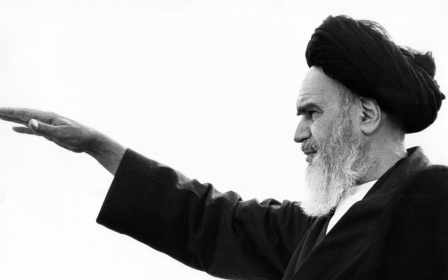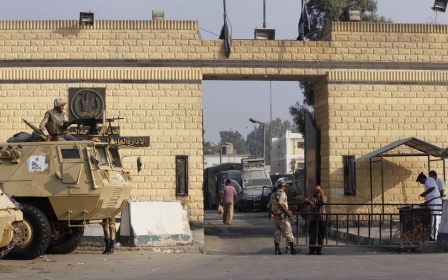Egyptian singer Shaabola releases song supporting Iraqi militia

One of Egypt’s most famous folk singers has released a song praising Iraq’s al-Hashd al-Shaabi militia coalition for its role in the fight against the Islamic State (IS) group.
Shaaban Abdel Rahim, popularly known as Shaabola, released the song “Big Words” just before the New Year in which he expressed love for Iraq and said that the fighters of the Iran-backed al-Hashd al-Shaabi were "real men" defending their country.
“I’ve got some big words, Coming out of my heart,” he sings in his distinctive voice. “If I see a dangerous terrorist, I’ll bring him al-Hashd al-Shaabi.”
Shaabola has said that the song is intended only as a show of support for the Shia group in its battle with IS and not as a political or sectarian statement.
The song comes amid reports of growing Iranian investment in Egypt, and waning Saudi influence, and sectarian and political tensions between the region's main Sunni and Shia powers.
The ever-flamboyant Shaabola shot to fame in Egypt in 2000 with his song “I Hate Israel,” and has built a career on his staunchly working-class background, folk lyrics, and distinctive singing voice.
“All the people of Egypt love you Iraq,” he sings in the video clip.
“We don’t care about Obama – or NATO or the Agreement,” he continues, most probably referring to the 2008 US-Iraqi Status of Forces Agreement that ended in 2011.
The agreement was highly unpopular in Iraq, as evidenced by the now-famous shoes thrown at then President George W Bush at a news conference announcing its signing.
“Ask about al-Hashd al-Shaabi, You’ll love them straight away,” Shaabola sings. “Real men who protect their country, and defend their land.”
The Iraqi state-sponsored al-Hashd al-Shaabi (the ‘Popular Mobilisation’) has been accused of carrying out war crimes during the campaign against IS since 2014.
Iraqi Prime Minister Haider al-Abadi admitted at an international security conference in February 2016 that some factions within the militia coalition were operating outside state control.
Al-Hashd al-Shaabi are also a key part of Iran's network of foreign militias fighting on its behalf across the Arab world, including in Syria in defence of President Bashar al-Assad's government.
READ: Proxies and Politics: Why Iran funds foreign militias
Near the end of the song he says: “Tomorrow we’ll go to Iraq, and we’ll live in a calm atmosphere.
“And walk on Abu Nuwas (a famous street in Baghdad), and Mosul and Ramadi.”
Mosul, which has been held by IS since 2014, is currently the focus of a major campaign involving Iraqi security forces, Iranian-backed militia groups, Kurdish Peshmerga fighters and a US-led international coalition to recapture the city.
Ramadi, in Anbar province, was recaptured from IS last year.
Jassim al-Hijjy, an Iraqi comedian and self-styled "national icon" and "darling of the masses" according to his Facebook page, makes an appearance in the video wearing a shirt with the al-Hashd insignia, and beats up a caricature of a terrorist.
In the final credits, al-Hijjy says: “We thank the Egyptian people, we are all brothers.”
“We thank Shaabola, you are Egypt, may God bless you, for this song for al-Hashd al-Shaabi,” he continues.
“We are all one country, thank God,” he adds. “We are against terrorism, and down with terrorism and hopefully there will be nothing left of it.”
In a separate video showing behind-the-scenes footage of the video clip being shot, Shaabola tells the camera: “I’m with you from my heart and I salute al-Hashd al-Shaabi and I love you and God willing I am with you and the ending of every unjust person and member of Daesh [an Arabic acronym for IS] by your hands.”
Behind-the-scenes on the set of "Big Words" where Shaabola praises al-Hashd al-Shaabi
However, an interview in the lead-up to the song’s release has resurfaced that appears to cast doubt on the extent of Shaabola's political support for al-Hashd and depth of knowledge about its activities.
Asked how the project came about, Shaabola said: “Someone from Iraq told me that these al-Hashd al-Shaabi are fighting Daesh… I did it against Daesh.”
Asked if he was afraid that the song would be interpreted as a political statement and whether he was taking sides amid regional Sunni-Shia tensions, Shaabola said: “No, no, not at all… The guy told me that these guys called al-Hashd al-Shaabi are fighting Daesh.”
He also denied that money was a motivating factor, saying he performed the song “against Daesh, and I want to get rid of Daesh everywhere".
He told the interviewer he was paid 10,000 Egyptian pounds ($546) for the song.
Shaabola, who has regularly spoken of his own illiteracy, has also previously sung songs against the 2003 invasion of Iraq, and mourning the execution of Saddam Hussein - hardly positions associated with Iraq's Shia militias.
Shaabola's interview in the run-up to the song's release
Saudi out, Iran in?
The song comes after a wave of reports in Arabic media suggesting that Iran is seeking to increase its investment in Egypt amid Cairo’s increasingly strained relations with Saudi Arabia, which had been Egyptian President Abdel Fattah el-Sisi's main regional backer since he came to power in a military coup in 2013.
But Egyptian-Saudi relations were seriously damaged by Cairo’s vote in favour of a Russia-sponsored UN Security Council resolution on Syria in October that went against the Gulf country’s position supporting the imposition of a no-fly zone.
Russia and Iran are the Syrian government's main international allies, while Saudi Arabia has backed rebel groups seeking to remove Assad from power.
In response, Saudi Aramco cut off fuel supplies to Egypt, forcing them to rely on Iraq instead.
An adviser to the Saudi royal family then visited Ethiopia, which is locked in a bitter battle with Egypt over the division of Nile River water, further straining relations.
Shaabola's music video for "Big Words"
Nader Fergani, an economist and professor of political science at Cairo University, said in a post on his Facebook page that increased Iranian investment in Egyptian media came on the heels of the government’s now-open support for Assad in Syria.
“These media outlets will not be openly hostile towards Saudi Arabia or the Gulf states, but will work in a more subtle way,” he said.
He added that public figures who were openly hostile to Saudi Arabia would be allowed greater freedom of movement in and out of Egypt, as well as greater freedom of speech inside the country.
This is certainly the hope of Ahmed Rasim al-Nafees, Egypt’s most well-known Shia proselytiser, who told Egyptian media he hoped the authorities would loosen their grip on those opposing Riyadh.
In a similar vein, Egyptian media reported that Iran was aiming to increase its total investment in Egypt to 20 billion Egyptian pounds ($1.1bn) over the next five years – a dramatic increase on the 2.4 billion Egyptian pounds it invested in the country between 1970 and 2011.
Nuts and saffron
Egyptian lawyer and activist Amr Abdel Hadi told the pan-Arab news website Arabi 21: “Saudi Arabia can no longer provide the huge level of support to Sisi that it used to right after the coup and during the reign of the late King Abdullah Bin Abdulaziz.
“Saudi Arabia’s debt levels are rising and even some of the other Gulf countries that used to support Sisi are now suffering from economic crises, so financial support to him has decreased.
“Nevertheless, he is demanding that they pay him on the basis that they asked him to lead the coup and, therefore, they have to fund it.”
“Iranian nuts and saffron is better than Gulf rice,” the political activist mused, referring to a leak from Sisi’s office in which the Egyptian president is heard saying the Gulf nations have so much money it is like rice for them.
According to a 2014 poll by the Pew Research Center, 83 percent of Egyptians had an unfavourable view of Iran, the second-highest in the Middle East after Jordan, where 87 percent had an unfavourable view of Iran.
Middle East Eye propose une couverture et une analyse indépendantes et incomparables du Moyen-Orient, de l’Afrique du Nord et d’autres régions du monde. Pour en savoir plus sur la reprise de ce contenu et les frais qui s’appliquent, veuillez remplir ce formulaire [en anglais]. Pour en savoir plus sur MEE, cliquez ici [en anglais].




